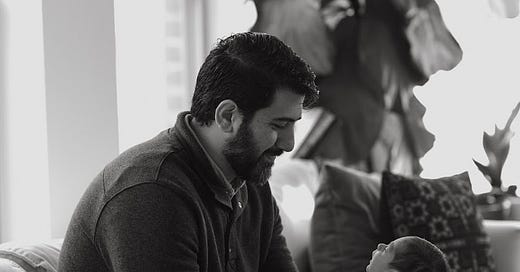Sometimes when my daughter is having a tantrum (about, say, the color of her pants) on a day my husband is on call, she will wail and then follow it up with, “I need Baba!”
The word she chooses always strikes me. Not “I want Baba” or “I miss Baba”. “I need Baba”.
She’s accurate. I need him, too.
Our household schedule functions on a week on, week off schedule. Instead of Sunday Scaries, I get Friday Fears—the Friday night before my husband starts his seven-on at the hospital, which means a weekend he’s working and I’m on point with the kids, followed by a Monday-Friday of late days for him.
Baba’s absence is always noticeable. We have different strengths as parents—he is playful, enthusiastic, in the moment; I tend to be more structured and future-oriented.
When the word “traditional” is used to describe a marriage or parenting relationship, it’s often meant that the father is a breadwinner. But it also can imply that the mother is not just the primary parent, but the more engaged parent. And the question I continue to come back to is, where along the way did the message become that a “traditional” father is a less engaged one?
“It came from the mothers,” my mom said. I asked her that question—why was there a cultural norm that parenting was a woman’s job?
She was observing my husband putting together the kids plates, and commented about the “samajdari” of “aaj kal ke ladke.”
Her estimation was that it was women who enabled sons to do nothing around the house, and when those sons became husbands, their mothers would hand off the baton of domestic labor not to their adult sons–now men–but to the adult women who married them. Once children came in the picture, childrearing would naturally become an extension of the domestic affairs.
To bypass men in this handoff was of course made easier by men bearing sole financial responsibility of the house because it offered an easy-out out of the house. It’s not an all-too-uncommon split that if a man is taking on the role of “default provider”, then the role of the woman is the “default parent”; but for whatever reason, the man’s participation was labeled not as “co-parenting”, but as “helping” or, worse, “babysitting”.
But Babas are essential as parents. Kids need their dads. “Engaged fatherhood has been linked to a whole range of outcomes,”
writes in his book Of Boys and Men, “from mental health, high school graduation, social skills, and literacy to lower risks of teen pregnancy, delinquency, and drug use.” The effect is sustained: 16-year-old girls close to their fathers continue to have better mental health at age 33. He notes that these results hold even among fathers who don’t live with their children’s mother, meaning that the father has a meaningful role to play even if the parents are not married.Yet despite both the research and religious history of a Prophet who was an engaged and doting father, somewhere along the way, the lesson has at times been missed among men in both mine and my husband’s culture. I don’t know where it was conveyed to men that from diapers to dishes, drop-offs to school events, Babas could just…opt-out.
Baba could leave a table after eating a dinner he didn’t prepare while the dirty dishes were still left on it, and Baba could leave in the morning to go out and provide a living without knowing the names of his kids’ teachers or pediatrician or friends.
Men have tended to the role of “protectors” and “providers”. But in a society that is far safer, where the same dangers and physical threats don’t exist, and where more women are more often economically independent, how do we channel this ambition of protecting and providing?
I posed a question about notions of culture and masculinity on Substack, and an answer that
wrote stuck with me: “I didn’t realize how important it was for me…to have a family to channel our ambition through and for.”Family can be the source of ambition, but also the place that ambition is oriented. To consider “providing” for a family as purely based on a father’s cash flow is a reduction of everything Babas have to offer: whole worlds inside of them, emotions, the desire to nurture, the ability to love, give big hugs and piggyback rides, and teach and model essential skills.
responded to my note with, “I never judged or understood my masculinity in comparison to/in relation to women. Rather, I understood…that manliness/masculinity is improving your situation/bettering your surroundings/overcoming.”Additionally, when a man sees his purpose as also inclusive of the caretaking of a family, rather than dominating them, a woman’s education and employment doesn’t threaten his standing nor his notions of what it means to be a Baba. Women as far back as early Muslim history fought wars, taught men, and served as politicians and doctors. The majority of Muslim countries have had female heads of state.
I also saw an interesting theme in comments from
, , and about gentleness and empathy/emotional availability as being such an important quality in men, and yet despite it being a Prophetic one, sometimes cultural notions are at odds with this. I think this has been a historical challenge—even in the Prophet’s time, he counseled against excessive harshness among his own people—and a challenge that spans all cultures (like here in America, with “boys don’t cry” messaging that teach men to stifle their emotional range).I felt a sense of responsibility, and perhaps urgency, after the birth of my son to consider more than I have before what it means to be a good man, so that I could know how to raise one.
And then I considered that perhaps the most essential recognition I could make was that so many behaviors that are simply kindness, and so many habits of functional adults and members of society, have been artificially categorized as feminine.
So now I think that what I am really called to do is raise good humans who recognize the responsibilities that come with any relationship: daughter or son, wife or husband, mother or father, and most of all, person to person. We are—all of us, man or woman—relational, whether we are parents or not, spouses or not. We are needed, for our unique strengths, in service of one another.






I'm a very hands on dad and in the past two years, for various reasons, have been more of the "lead parent" when it comes to executing lots of the daily routines of the household (even if my COO wife laments that she still carries the bulk of the mental load. She does, and we still haven't perfected how to balance it).
I hate when I see politicians and reporters talk about the tragedy of "women and children" dying and suffering in conflict, leaving out the men, as though any adult males who perish aren't real casualties, or are legitimate casualties. Fathers provide so much to their family and community - often sacrificing the entire core of their individuality to those they seek to serve and lift up.
Mothers, fathers, and caregivers of any gender can all play invaluable roles, as varied as snowflakes in a blizzard. Every life matters, we NEED to see it that way, and the more we can celebrate these stories the more humane we can make the world.
Loved the post, took me back to this scroll line : The man who never leaves his street does not echo—he roots the street, he holds the beat. https://thehiddenclinic.substack.com/p/the-echo-and-the-root